- Home
- Christopher Moore
Secondhand Souls Page 2
Secondhand Souls Read online
Page 2
“No, I mean I feel like you made a wish, and I granted it, but you forgot to specify the circumstances, so you were tricked.”
“When did I ever wish I had this?” He gestured to his dong, which unfurled out of his robe and plopped onto the rug.
“You were pretty delirious when you were dying. I mean, you didn’t explicitly ask for it, but you did go on about your regrets, most of which seemed to be about women you hadn’t had sex with. So I thought—”
“I’d been poisoned. I was dying.”
During his battle in the sewers below San Francisco with a trinity of ravenlike Celtic death goddesses called the Morrigan, one had raked him with her venomous claws, which eventually killed him.
“Well, I was improvising,” said Audrey. “I’d just had sex for the first time in twelve years, so I may have put a bit too much emphasis on the male parts. Overcompensated.”
“Like with your hair?”
“What’s wrong with my hair?” She patted her swoop of hair, which approximated the shape of Hokusai’s The Great Wave, and would have looked more in place on the runway of an avant-garde fashion show in Paris than it did anywhere in San Francisco, especially in a Buddhist center.
“Nothing’s wrong with it,” Charlie said. How had he blundered into talking about her hair? He was a beta male and he knew by instinct that there was no winning when it came to discussing a woman’s hair. No matter where on that path you started, you were bound to stumble into a trap. Sometimes he thought he might have lost a mental step or two in the transfer of his soul to this body, even if it had been done only moments after his death. “I love your hair,” he said, trying for the save. “But you’ve said yourself that you were sort of overcompensating for having your head shaved for twelve years in Tibet.”
“Maybe,” she said. She was going to have to let it go. For one thing, as a Buddhist nun, being vain and whiny about how her hair looked was a distinct regression in spiritual evolution; plus, she had trapped the man she loved in a tiny body she’d cobbled together from disparate animal parts and a good-sized block of turkey ham, and she felt responsible. This was not the first time they’d had this discussion, and she couldn’t bear to extricate herself from it using a weak, Kung Fu of the Disrespected Hairdo move. She sighed. “I don’t know how to get you into a proper body, Charlie.”
So there it was, the truth as she knew it, laid out on the carpet as limp and useless as—well—you know.
Charlie’s jaw (and there was a lot of it) dropped open. Before, she’d always said it might be complicated, difficult, but now . . . “When I started buying soul vessels from your and the other Death Merchants’ stores, putting them into the Squirrel People, I didn’t know how to do that either. I mean, I knew the ritual, but there was no text that said it would work. But it did. So maybe I can figure something out.”
She didn’t believe for a second she could figure it out. She’d moved souls from soul vessels into the meaty dolls she constructed, using the p’howa of forceful projection, thinking that she was saving them. And she’d used the p’howa of undying on six terminally ill old ladies, thinking she was saving their lives, when, in fact, she had simply slowed their deaths. She was a Buddhist nun who had been given the lost scrolls of the Tibetan Book of the Dead and she could do things that no on else on earth could do, but she couldn’t do what Charlie wanted her to.
“The problem is the body, isn’t it?” asked Charlie.
“Kind of. I mean, we know there are people out there walking around without souls, and that eventually a soul vessel will find them, they will find it, but what would happen to their personality if we forced your soul into someone, then they encounter their soul vessel?”
“That would probably be bad.”
“Right, plus, when a soul goes into a vessel it loses its personality: the longer it’s out of a body, the less personality it retains, which is good. I think that’s why we learn as Buddhists that we have to let go of ego to ascend spiritually. So what if I could move your soul into someone who didn’t have a soul, hasn’t encountered their soul vessel yet. It might destroy their personality, or yours. I don’t want to lose you again.”
Charlie didn’t know what to say. She was right, of course. The Squirrel People were prime examples of souls without memory of their personalities. Except for a couple, whom Audrey had moved when the soul had been fresh in the soul vessel; all of them were just goofy little meat puppets. They’d built their own little city under the porch.
“Phone,” said the meat puppet Bob as he entered the room, followed by a dozen other Squirrel People Charlie’s size. Bob was so called because Audrey had constructed him using a bobcat skull, which now sat on the bright red miniature beefeater uniform of a Tower of London guard. He was the only one of the Squirrel People besides Charlie who could talk; the others hissed, clicked, and mimed to get their points across, but they were all elegantly dressed in the costumes Audrey had made for them.
Bob handed the cordless handset to Audrey, who clicked the speaker button.
“Hello,” she said.
A little girl’s voice said, “I am become Death, destroyer of worlds!”
Audrey held the phone out for Charlie. “It’s for you.”
Detective Inspector Nick Cavuto, Rivera’s partner on the SFPD for fifteen years, stood over the pile of pale and black that lay on the floor behind the counter of Rivera’s store.
“Looks like you killed a witch,” he said. “Sad,” he said. “Lunch?”
He was six foot four, two hundred and sixty pounds, and took great pride in playing the old-school, tough-guy detective: wearing a fedora from the 1940s, rumpled suits, chomping on cigars he never lit, and carrying a blackjack in his back pocket that Rivera had never seen him use. In the Castro, where he lived, he was known as “Inspector Bear.” Not to his face, of course.
“She’s not dead,” said Rivera.
“Shame. I was hoping munchkins would come sing the ding-dong song in your shop.”
“She’s not dead.”
“We could knock off a couple of verses if you want. I’ll start. You come in on ‘which old witch’?”
“She’s not dead.”
“How long’s she been out?”
“About twenty minutes, then thirty minutes, that’s when I called you, then”—he checked his watch—“about fifteen minutes.”
“So she came to and you rezapped her?”
“Until I could figure out what to do.”
“You miss the job, don’t you?” Cavuto pushed his hat back on his head and looked to Rivera for the confession. “You know, technically, you being active reserve, you can ride along with me anytime you feel like Tasing someone. Zapping random hippie chicks in your store can’t be good for business. You’ll have to buy lunch, of course.”
When they were both on the job, Cavuto usually started talking about lunch while he was still eating breakfast.
“She’s not a normal hippie chick.”
“No doubt, most people are just down then right back up. That’s a long time to be out from a stun gun.”
Rivera shrugged. “It’s her best quality, as far as I can tell.”
“You’re going to have to figure something out, you can’t keep stunning her, I can smell burning—is that Scotch?”
“Peat, I think. Yeah. That’s not from the stun gun, that’s just how she smells.”
“Want me to cuff her? Take her in? I can probably get a psych hold on her for the outfit alone.”
“I think she might be a supernatural being,” Rivera said. He rubbed his temples so he didn’t have to look at Cavuto’s reaction.
“Like the alleged bird woman you allegedly shot nine times before she allegedly turned into a giant raven and allegedly flew the fuck off ? Like that?”
“She was going to kill Charl
ie Asher.”
“You said she was giving him a hand job.”
“This one’s different.”
“No hand job?”
“No, in that she’s a completely different creature. This one doesn’t have claws that I can see. This one just screams.”
“But you’re sure she’s supernatural because . . . ?”
“Because when she screams my head fills with images of people dying and other horrible things. She’s a supernatural being.”
“You’re a supernatural being, ya berk,” said a female voice from the floor. She sat up.
Rivera and Cavuto jumped back, the latter with a slight yip.
“One of those wee soul collectors, ain’t ya? Sneakin’ about all invisible-like.” She tossed her hair out of her face—a twig flew out onto the carpet.
“You’re not from around here, are you?” said Cavuto, acting as if he hadn’t just yipped in fear like a tiny frightened dog.
“AHHHHHHHHIEEEEEEEEE!”
The two jumped back farther as she climbed to her feet. Cavuto shook his head as if trying to clear a cloud from his vision.
“See?” Said Rivera.
“Do you have any ID ma’am?” asked Cavuto.
“I’m Bean Sidhe, ya great mortal twat! AHHHHHHHIEEEEEEEE!”
“ZZZZZT!” said the stun gun.
She fell back into a pile of rags. Cavuto had snatched the stun gun and put her down himself. He handed it back to Rivera then knelt, drew the handcuffs from his belt, and snapped them around her slight wrists.
“She’s cold.”
“Supernatural,” said Rivera.
“She’s not the only one, evidently.” He took off his hat so Rivera could see his cocked eyebrow of inquisition.
“I’m not supernatural.”
“I don’t judge. I am not a judger. It’s traumatic. I know how I felt when I got outed by surprise.”
“How was that a surprise? You were marching in the Pride Parade wearing your dress blue uniform with no pants and a yellow codpiece.”
“Didn’t mean I was gay; Cops without Pants was the theme that year. You got any duct tape? That shriek is fucking spooky.” Cavuto rolling with the weird, as he always had. He had the ability to deny a supernatural situation while simultaneously dealing with it in a practical way, which is why Rivera had called him in the first place.
“You’re going to tape her mouth?”
“Only until I get her to St. Francis and can get them to sedate her and sign off on a psych hold. I’ll say she did it herself.”
“St. Francis isn’t ten blocks from here. Throw her in the car, hit the lights, and you’ll be there before she comes to.”
“I’m not going to carry her to the car when she is perfectly capable of walking on her own, probably.”
“I’ll help you. It might be twenty minutes before she comes to.”
“Plenty of time for you to go buy burgers down the block and bring them back.”
“I’ll call the order in and go pick it up.”
“Curly fries. Two doubles, no tomato. You’re buying.”
“Inspector Cavuto, you are a huge lunch whore,” said Rivera, reaching for the phone.
“Protect and served, lunch—SFPD motto.” The big cop grinned. “But it may not be a bad idea to keep her down. I have some zip restraints in the car for her ankles. Call for burgers.”
Rivera hit the burger button on speed dial and watched his ex-partner lumber out to the brown Ford sedan, which was, as usual, parked in a red zone. The big man popped the trunk and stirred around inside.
The girl from the burger place came on the line with a perky, “Polk Street Gourmet Burgers, can I help you?”
“Yeah, I’d like—”
ZZZZZT!
He barely heard the sound, just a spine-wrenching white-hot pain that started at the back of his neck and bolted to his extremities. Through the sizzling disruption of his thoughts he remembered he’d left the stun gun on the counter behind him. When he came to, Cavuto was kneeling over him.
“How long was I out?”
“Ten, maybe fifteen seconds.”
Rivera rubbed the back of his head. Must have hit it on the edge of the counter when he fell. Every joint in his body hurt. He rolled to his hands and knees and looked back to where the raggedy woman had been lying.
“Gone,” said Cavuto. He dangled his handcuffs in front of Rivera’s eyes. They were still locked. “I heard her scream again, ran in, she was gone.”
“The back door is locked,” said Rivera. “Go after her.”
“Not going to matter. She’s gone.”
“What’s with all the smoke? She start a fire?”
“Nope. Just a cloud of smoke behind the counter where I guess she was standing when she zapped you.”
“Oh.”
“Yeah,” said Cavuto. “You’re going to need to call someone with more experience at this than me.” He picked up the phone receiver from the floor, held it to his ear. “Yeah, did you get that order? Two double burgers, medium well, everything but tomatoes, curly fries.” He looked at Rivera. “You want anything?”
3
Something About Sophie
Sophie Asher was seven years old. She lived in San Francisco with her aunties, Jane and Cassie, on the second floor of a building that overlooked the cable-car line in North Beach. Sophie had dark hair and blue eyes, like her mother, and an overactive imagination, like her father, although both parents were gone now, which is why she was looked after by her aunties; two widows who lived in the building, Mrs. Ling and Mrs. Korjev; as well as two enormous black hellhounds, Alvin and Mohammed, that had simply appeared in her room when she was a toddler. She liked dressing up like a princess, playing with her plastic ponies, eating Crunchy Cheese Newts, and making grandiose declarations about her power over the Underworld and her dominion over Death, which was why she was currently in a time-out in her room while Auntie Jane was frantically chattering into the phone out in the great room.
From time to time, Sophie popped her head out the door and fired off another salvo of flamboyant nonsense, because she was the Luminatus, dammit, and she would have the last word.
“I am become Death, destroyer of worlds!” she shouted, her passion somewhat diffused when the pink ribbon holding her pigtail caught in the door as she ducked back into her room.
“So, that’s what we’re dealing with here,” said Jane into the phone. “She’s gotten completely out of hand.” Jane was tall, angular, and wore her short platinum hair sculpted into various unlikely permutations, from angry spikes to soft finger waves, all of which played counterpoint to the tailored men’s suits she wore when she worked at the bank, making her appear either fiercely pretty, or frightfully confused. Right now she wore a houndstooth tweed Savile Row suit she’d inherited from Charlie, waistcoat with watch chain, and a pair of eight-inch patent-leather red pumps the same shade as her bow tie. She might have been the result of a time-travel accident where Doctor Who parts were woven into the warp with those of a robot stripper.
“She’s seven,” said Charlie. “Finding out that you’re Death—it’s hard on a kid. I was thirty-three when I thought I was the Luminatus, and I’m still a little traumatized.”
“Tell him about the tooth fairy,” said Cassie, Jane’s wife. She stood barefoot by the breakfast bar in yoga pants and an oversized olive-green cotton sweater, red hair in loose, shoulder-length curls—a calm snuggle of a woman, a chamomile chaser to Jane’s vodka and sarcasm shooter.
“Shhh,” Jane shushed. Sophie didn’t know that Jane was talking to her father, thought, in fact, that he was dead. Charlie had wanted it that way.
“She doesn’t play well with others,” said Jane. “I mean, since she’s this magical thing, she has unrealistic expectations about other magic
al—uh, persons. She lost a tooth the other day—”
“Awe,” said Charlie.
“Awe,” said Bob, and the other Squirrel People in the room with him, who were gathered around the speakerphone like it was a storyteller’s campfire, made various awe-like noises.
“Yeah, well, the tooth fairy forgot to put money under Sophie’s pillow that night—”
At “tooth fairy,” Sophie popped her head out the door. “I will smack that bitch up and take her bag of quarters! I will not be fucked with!”
Jane pointed until Sophie retreated into her room and closed the door.
“See?”
“Where did she learn that? Little kids don’t talk that way.”
“Sophie does. She just started talking like that.”
“She didn’t when I was alive. Someone had to teach her.”
“Oh, so you’re fine that she all of a sudden becomes Death incarnate without so much as seeing a Sesame Street segment about it, but a little light profanity and it’s all my fault.”
“I’m not saying that, I’m—”
“It’s Jane’s fault,” said Cassie, from across the room.
“You traitorous dyke.”
“See,” said Cassie. “She’s uncouth.”
“I am couth as fuck, Cassie. Who has cash anymore? I was going to pay the kid for the tooth the next day. Sophie has unrealistic expectations.”
“What do you want me to do?” Charlie asked. “I can’t exactly discipline her.”
“That’s the point: no one can discipline her.”
“Fear of kitty?” Charlie asked. When Sophie was just learning to talk, and Charlie had bought her dozens upon dozens of pets, from hamsters to goldfish to hissing cockroaches, only to find them dead a few days later, he discovered, quite by accident, that if Sophie pointed at a living thing and said the word “kitty,” said thing would immediately become unliving. The first time it had happened, to a kitten, in Washington Square Park, had been a shock, but the second time, only minutes later, when Sophie had pointed at an old man and uttered the dreaded k-word, only to have him drop dead on the spot, well, it had become a problem.

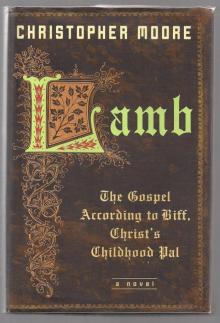 Lamb: The Gospel According to Biff, Christs Childhood Pal
Lamb: The Gospel According to Biff, Christs Childhood Pal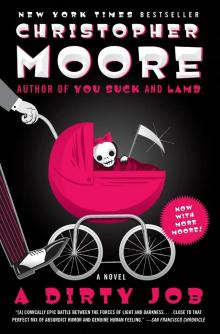 A Dirty Job
A Dirty Job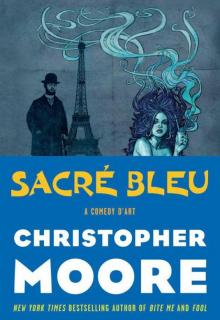 Sacré Bleu
Sacré Bleu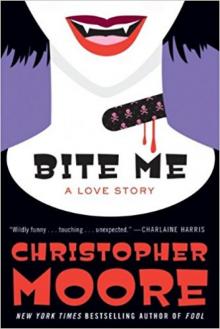 Bite Me: A Love Story
Bite Me: A Love Story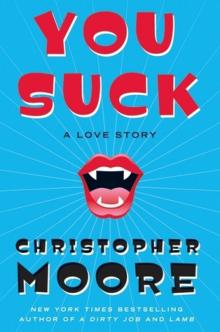 You Suck: A Love Story
You Suck: A Love Story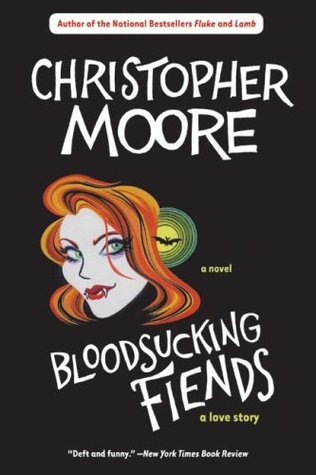 Bloodsucking Fiends: A Love Story
Bloodsucking Fiends: A Love Story The Stupidest Angel
The Stupidest Angel Coyote Blue
Coyote Blue The Lust Lizard of Melancholy Cove
The Lust Lizard of Melancholy Cove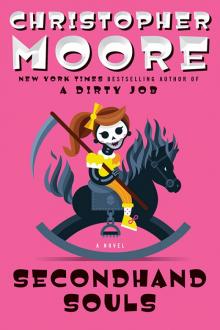 Secondhand Souls
Secondhand Souls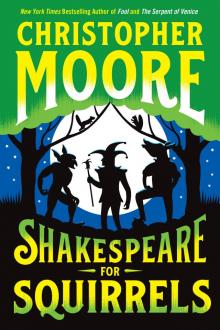 Shakespeare for Squirrels
Shakespeare for Squirrels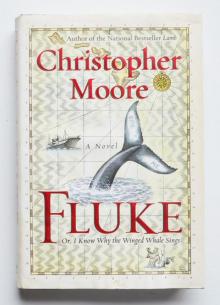 Fluke, or, I Know Why the Winged Whale Sings
Fluke, or, I Know Why the Winged Whale Sings Island of the Sequined Love Nun
Island of the Sequined Love Nun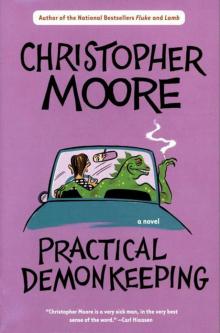 Practical Demonkeeping
Practical Demonkeeping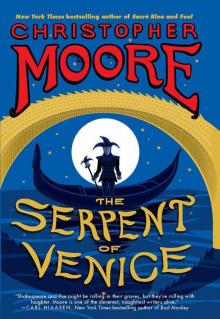 The Serpent of Venice
The Serpent of Venice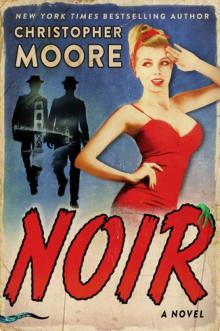 Noir
Noir Lamb: The Gospel According to Biff, Christ’s Childhood Pal
Lamb: The Gospel According to Biff, Christ’s Childhood Pal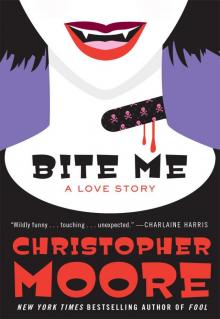 Bite Me
Bite Me Bloodsucking Fiends
Bloodsucking Fiends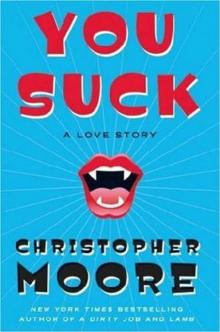 You Suck ls-2
You Suck ls-2 Bloodsucking Fiends ls-1
Bloodsucking Fiends ls-1 The Stupidest Angel: A Heartwarming Tale of Christmas Terror
The Stupidest Angel: A Heartwarming Tale of Christmas Terror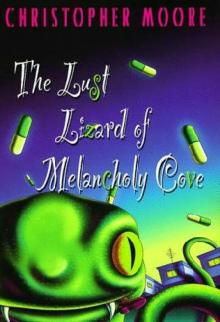 The Lust Lizard of Melancholy Cove pc-2
The Lust Lizard of Melancholy Cove pc-2 You Suck
You Suck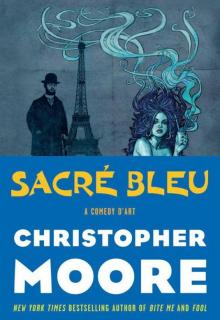 Sacre Bleu: A Comedy d'Art
Sacre Bleu: A Comedy d'Art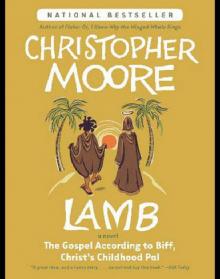 Lamb
Lamb 1867
1867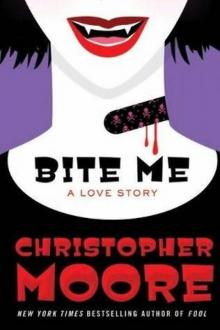 Bite Me ls-3
Bite Me ls-3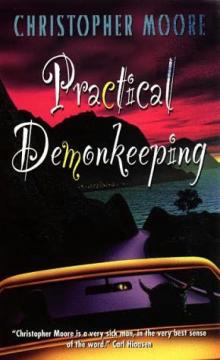 Practical Demonkeeping pc-1
Practical Demonkeeping pc-1